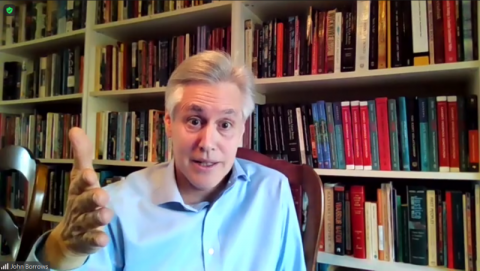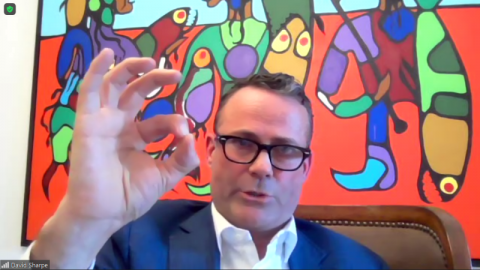


Students from Queen’s Law and the Smith School of Business host a full-day conference focused on building relationships between Indigenous and non-Indigenous people in corporate Canada and in law.
On March 6, over 80 participants took part in the Queen’s Conference on Indigenous Reconciliation (QCIR), a virtual symposium, where Indigenous leaders shared perspectives on how to promote pathways to economic reconciliation and achieve greater inclusivity across all sectors and industries in Canada. Queen’s students, faculty, staff, and other attendees from across Canada learned about the existing barriers to realizing economic reconciliation, as well as the role that students, as future lawyers and business leaders, must play in helping to overcome these challenges.
Keynote speaker John Borrows, Canada Research Chair in Indigenous Law at the University of Victoria Law School, explored how Indigenous ethical and legal traditions can benefit the broader Canadian legal system, and lead to a revitalization of common law that can promote economic reconciliation and drive long-term sustainable opportunities.
“Live with love, truth, honesty, courage, wisdom, and humility. Those are the pathways that our ancestors historically chose to try to sustain ourselves, and these are the pathways that are going to lead us to a healthier and wealthier future that is more holistic,” said Borrows, who is Anishinaabe/Ojibway from the Chippewas of Nawash unceded First Nation.
Recognizing that Indigenous wealth should be part of Canada’s response to the Truth and Reconciliation Commission’s call for the corporate sector to implement the United Nations Declaration on the Rights of Indigenous People, he said, “For millennia, Indigenous communities have managed collective wealth with a strong sense of stewardship and consideration for future generations.” He explained that wealth is not solely about a capital exchange, and the selling of goods and services. It involves a broader appreciation and obligation to land, water, plants, insects, fish, birds, and animals, as well as community members as both “generators of wealth and beneficiaries of wealth.” These foundational ethics have informed Indigenous laws for generations and have been defined and guided by the natural world.
Providing important insights for the next generation of legal practitioners in Canada, Borrows explained how legal literacy in Indigenous tradition draws guidance from life and sustainability within the natural world. Similar to how the Canadian constitutional tradition has incorporated broad, aspirational concepts such as peace, order, good government, life, liberty, security, freedom, equality, association, the Anishinaabe have broad aspirational concepts in its constitutionalism through love and the ancestral teachings. This legal tradition, informed by ecology and sustenance, binds humans and the environment to promote a rich diversity of natural life.
“We have common law in Canada, the civil law in Canada, but we also have Indigenous law in Canada,” Borrows said, “and that should form the standards of judgment, the principles, the criteria, the guideposts, the measures for taking action to see that we have a trans-systemic way of engaging with one another and recognize there are different sources of law, that can be put into our duties to maintain the integrity of the law.”
To illustrate his point that it is a lawyer’s duty to think about Indigenous law as promoting the interests of the state, Borrows referred to a Supreme Court of Canada decision that cited Dean Mark Walters (who gave introductory remarks at the conference). In that citation, Walters said, “When you’re dealing with Aboriginal peoples and Aboriginal rights, a morally and politically defensible conception of these rights will incorporate both legal perspectives.” Borrows then concluded for lawyers that maintaining their duty to the state and their ethical duty is to reconcile Indigenous laws alongside federal and provincial law.
Following the keynote address, participants attended a series of expert panels and breakout workshops.
David Sharpe, Law’95, Bridging Finance Inc. CEO, Queen’s Law Dean’s Council Chair, and Queen’s trustee led a workshop on First Nations negotiations, the subject of a course he teaches at his alma mater. Engaging with his audience using a fact scenario from a real Supreme Court of Canada case he discussed how agreements should deliver benefits to both the third-party stakeholders and the First Nation, which in turn provides greater business certainty, long-term economic viability and supports viable partnerships.
In another interactive workshop, participants learned from business leaders the importance of capacity building and how to gain practical skills and knowledge relating to truth and reconciliation.
The final session of the day featured a dynamic panel of speakers who provided their views on the legal profession, the role of Indigenous law and legal reconciliation. Hugo Choquette, Law’05, LLM’10, PhD’17, Academic Director of the Certificate in Law program, moderated the session that included two alumni: Sara Mainville, Law’04, and John Rowinski, Law’00.
“I am tremendously respectful to the Indigenous right to self-determination,” said Mainville, a partner with Olthuis Kleer Townshend LLP, a firm that focuses on sovereignty and justice for Indigenous peoples. “I am never critical of deals that the community has made for themselves,” she added, pointing to the Ontario energy industry as an example of where there are mechanisms and tools in the regulatory regime, administered by the Ontario Energy Board, to promote and incorporate Indigenous partnerships.
“Economic reconciliation is about infusing Indigenous economies into the western version as well. That often gets lost,” said Rowinski, CEO at Noozhoo Nokiiyan Limited Partnership, the economic development arm of Mississaugas of Scugog Island First Nation. “Making money is the easy part but building the economy in a self-sufficient way is important.”
In a second panel, Indigenous business leaders spoke about opportunities and barriers to economic reconciliation, the importance of social enterprise and social finance in reconciliation, and the role of Indigenous economies.
Following the formal agenda, participants had the opportunity to visit separate virtual rooms to network with speakers, and moderators.
The Queen’s Conference on Indigenous Reconciliation was inspired by Andrée Cazabon’s documentary Reconciliation on Bay Street.
By Tim Butters